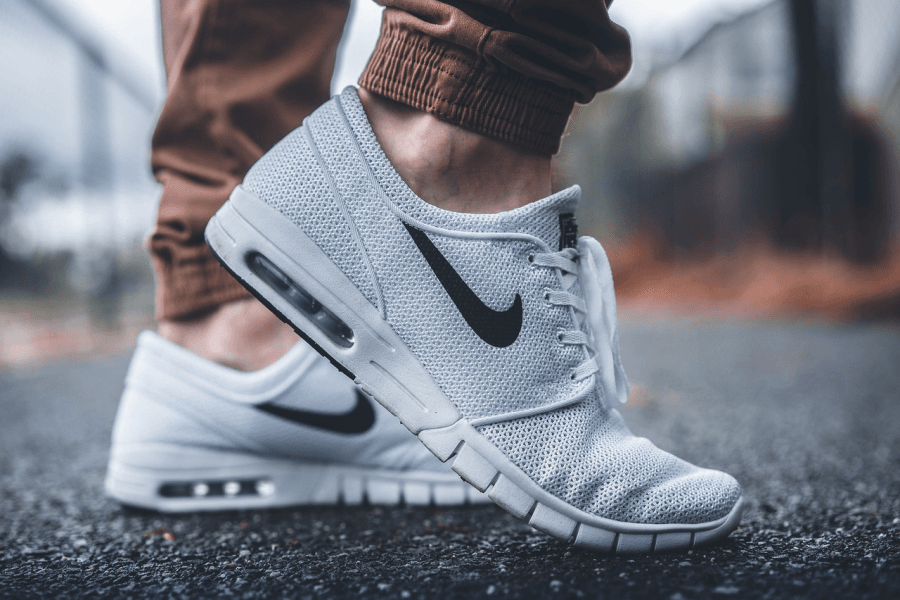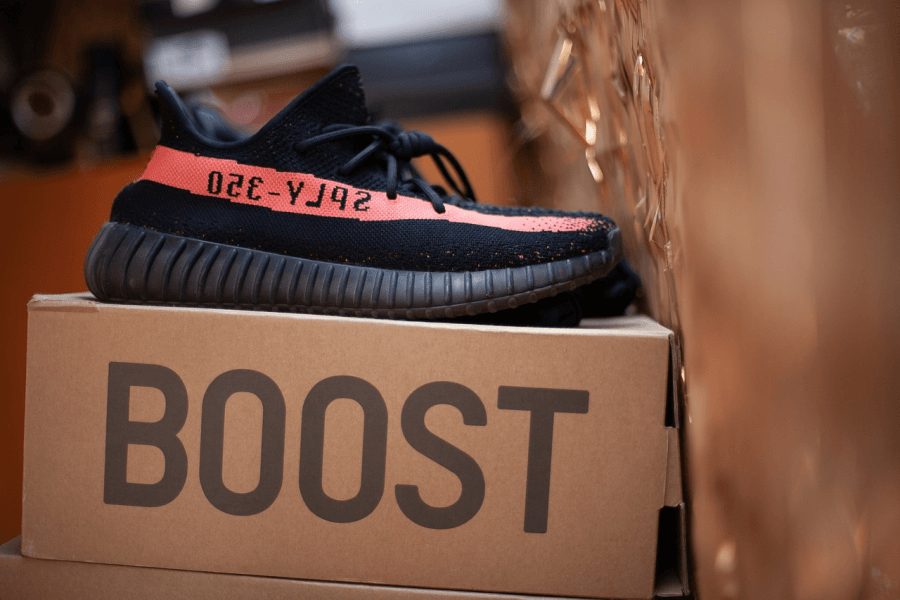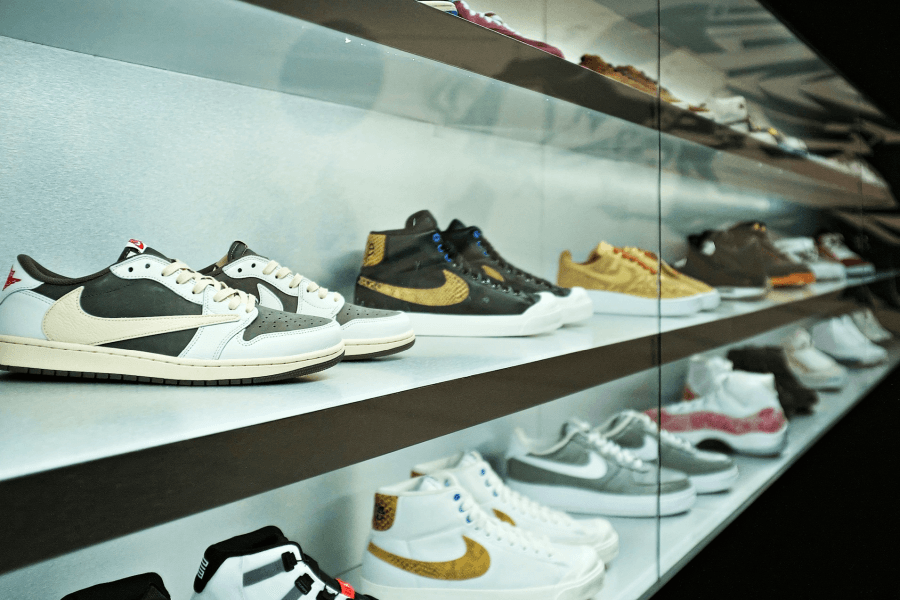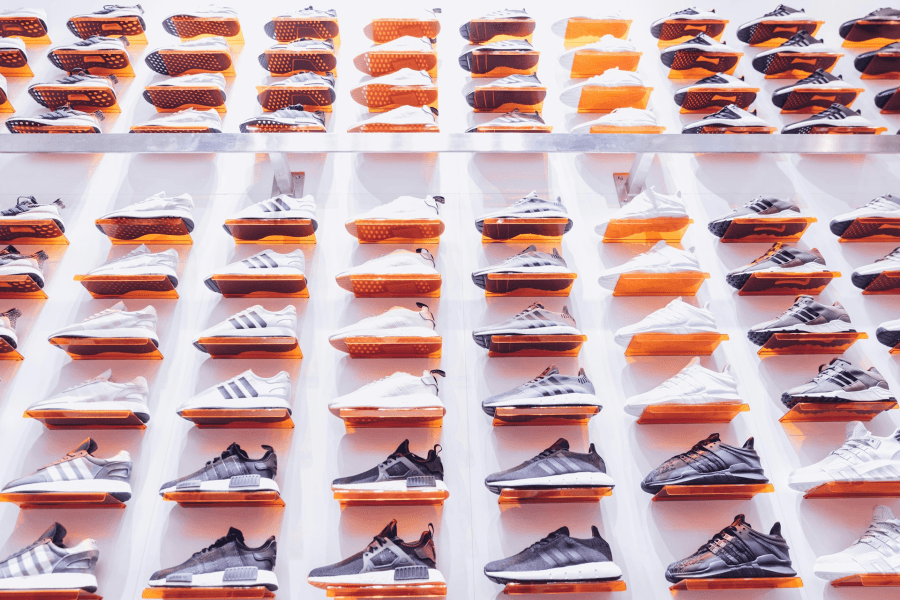Believe it or not, there was a time when sneakers were only worn to the gym, sports, or short commutes. The vibrant sneaker community we see today was non-existent, and these shoes often came in clunky shapes and awkward silhouettes.
But today, the script has changed—sneaker culture is now part of mainstream fashion, with popular brands like Canvas, Adidas, Vans, and Nike attracting a cult-like following worldwide.
For example, the highly anticipated Travis Scott x Air Jordan 1 Low OG “Medium Olive” drop in September 2024 was huge. The kicks featured the flipped swoosh on the lateral sidewall, tongue embroidery on the heel, and the Cactus Jack (Travis Scott's record label) branding. Initially, they sold for around $150, but as the demand surged, prices went as high as $1000 per pair, showing a loyal fanbase and a massive demand for limited edition sneakers.
Thanks to the high resale value, the rise of the sneakerhead culture, and a vibrant community, it's definitely a good time to get into the sneaker game. However, it's not as easy as going to your local retailer, purchasing a pair, and reselling them for a higher price. As you'll see in this article, the process is far more complicated than that.
You must first learn sneakerhead slang. Next, you should know marketplaces where you can get your hands on the hottest releases on the market—the higher the hype, the higher the chances of reselling. Finally, you should choose an ideal platform to resell your kicks. Examples include websites like StockX and social media platforms like Instagram and Discord.

This article will show you what it takes to get into the sneaker game. By reading, you will learn the prerequisites to keep in mind before you start reselling sneakers. You'll understand why the sneaker reselling business is lucrative and gain insights into what you must do to gain a competitive edge over other coppers and resellers.
Why Sneakers? The Appeal of the Sneaker Game
Today, sneakers are more than just apparel. For collectors, a shoebox is a time capsule that offers a glimpse into the past and the future. For sneaker resellers, the sneaker game is a side hustle with the potential to grow into a full-time lucrative business. For casual wearers, sneakers give them the confidence to leave a mark with every step.
And even as this industry continues to take its rightful place as a cornerstone of modern fashion, it's hard not to deny the influence of celebrities on your choice of kicks. For example, when Kendall Jenner rocked Adidas Superstars in 2015, sales of the shoe went up by 80%. And when Bella Hadid was seen donning Nike Air Force 1s in 2017, sales skyrocketed by 35%.
Thanks to celebrity influence and other factors, sneakers have evolved to become a form of self-expression—they allow wearers to show their beliefs, creativity, and personalities to the world. For instance, bold and vibrant kicks often signify an adventurous, extroverted spirit, while minimalist designs reflect practicality and organization. This allows the wearer to communicate without having to say a word.
Thanks to their popularity and exclusivity, the sneaker reselling business can be lucrative—if you know what you're doing. But before you get into the game, which type of sneaker enthusiast are you?
Types of Sneaker Enthusiasts: Which One Are You?
Up to this point, you know that the sneaker culture has been rising in popularity thanks to sports, music, and celebrity influence. You may want to cop sneakers to build a collection or resell them for a higher value.
Fair enough.
Before you do that, you must first do a little bit of reflecting and figure out who you are in the world of sneakers:
- Sneaker collector
If you want to cop sneakers that hold some sort of historical or cultural significance, you're probably a sneaker collector. With the right tools and money, you can build a custom sneaker collection that reflects your passion and style.
- Sneaker reseller
If you want to buy the latest, hottest kicks to resell them at a higher price, you're a reseller. Just make sure to do your homework and invest in limited-edition sneakers, deadstock pairs, and grails that collectors desire the most.
- Sneaker enthusiast
An enthusiast is someone who is fascinated by sneakers and the culture around them. Consider yourself an enthusiast if you collect your favorite kicks as a hobby, follow industry trends, and participate in discussions.
Figured out who you are? If so, it's time to move on to the next step: understanding what the sneaker reselling industry is all about.
Understanding the Sneaker Market and Trends

There's no denying that the sneakerhead community is growing. Here are popular sneaker brands and collaborations in 2024:
- Travis Scott x Air Jordan collaborations
A famous rapper and music producer, Travis Scot has become a significant figure in the sneaker industry. His collaborations with Nike have generated millions of dollars in revenue, thanks to a loyal fan base and immense hype.
For example, Travis Scott x Air Jordan 1 premium, which was released on September 28, 2024, initially retailed for approximately $150. As the demand grew and supply fell, they became a coveted item, reselling at an average of $1,000.
- Ye's Yeezy line
Ye, formerly known as Kanye West, is one of the biggest celebrities in sneaker culture. His collaboration with Nike led to the creation of the Nike Air Yeezy 2 "Red October," which was released in 2014.
Initially, these kicks retailed for $245, which may seem like a lot of money, but it's nothing compared to today's prices. A quick search on StockX will give you an idea of the sharp increase in value since these shoes were released ten years ago. We only found one listing on StockX going for a minimum of $9,100.
- DJ Khaled's sneaker collection
Known for producing some of the decade's most popular songs, DJ Khaled is also a passionate sneaker copper, so much so that his collection has become a trendsetter in the sneaker space. His sneaker room looks like a museum, with over 10,000 pairs, including rare kicks that even the most passionate sneakerheads can only dream of owning.
His sneaker collection is worth over $8 million. So iconic is his sneaker game that in 2022, Airbnb partnered with the record producer for a deal that would allow sneakerheads to spend a night in his popular sneaker closet.
If you're looking to start reselling sneakers, these are just a few current trends you should know about. The gist is that celebrity influence is a huge factor in the sneaker game, so you want to go for kicks that generate a lot of hype thanks to their association with a popular sneakerhead, such as Travis Scott or DJ Khaled.
Limited Edition vs. General Release: How Rarity Impacts Value
Now that you know what's happening in the sneaker space, you must choose the sneakers that you want to cop. Releases will mostly fall into two broad categories—limited edition and general release. Here's what you should know:
Limited Edition Sneakers
Limited releases refer to sneakers manufactured and sold in small quantities. Most of these drops tend to be associated with celebrity collaborations and special editions. Their exclusivity is what gives them their unusually high demand. Here are the tell-tale signs of a limited release:
- Scarcity
The drops are often limited to a few pairs, which can drive up demand and make these kicks significantly harder to get your hands on.
- Hype and anticipation
These releases often cause a massive buzz on social media platforms and sneaker communities.
- Unique design elements
Limited edition sneakers often feature unique design elements, packaging, and branding that differentiate them from general releases.
- Resale value
These sneakers often have high resale values because of their increased demand and exclusivity.
General Releases
General releases feature sneakers produced in much larger quantities as part of a company's regular lineup. Here's what you need to know:
- Widely available
You can find these kicks on many online and physical retailers and stores
- Lower hype
While some may still generate public interest, most general releases do not create the same level of excitement as limited editions.
- Lower resale value
Due to the lower hype, they may not have the same resale value as limited edition sneakers.
Whichever option you decide to go for—limited edition or general release—the process of getting started and dipping your toe into the game relies on the same basic principles, which we have outlined below:
How to Get Started in the Sneaker Game

Now that you know how the sneaker drops work, you may want to cop sneakers yourself. There are a couple of things you need to do before you decide to invest your hard-earned money in your favorite kicks.
Step 1: Educate Yourself on Sneaker Brands and Models
Before doing anything, you want to do some due diligence. What are the most popular sneaker brands right now? How is the sneaker market? Are sales rising? What of celebrity collaborations? Are there any coming up?
You need to have solid ground before you cop sneakers for reselling. If you're wondering where to get this information, don't worry; we've got you covered.
- Sneaker communities
Online sneaker communities like NikeTalk and Reddit forums like r/sneakers are great places to start. Also, join social media groups on Facebook and Discord to connect with fellow sneakerheads, collectors, and enthusiasts to learn about the current market trends and best practices for getting into the game.
- Sneaker news websites
You can also gain valuable insights by subscribing to newsletters from popular sneaker websites like Sneaker News and Highsnobiety. These platforms feature news articles that talk about the most popular sneakers as well as current trends in the market.
- Retailer websites
The next place to learn about popular brands and models in the sneaker industry is retailer platforms like StockX and GOAT. While most of what happens on these platforms revolves around buying and selling sneakers, they also provide data on resale prices for various brands. You can also check official brand websites for popular models like Nike and Adidas for more information.
Step 2: Follow Sneaker Releases and Drops
Once you develop a reading list of the most informative platforms for information on popular models and trends, you need to stay in the know and be aware of upcoming drops and releases so that you can make the most out of them. Here's how you can do that:
- Sneaker apps
There are many sneaker apps you can download to stay informed about upcoming drops and releases and get a fair chance of purchasing your favorite kicks. A few examples include Nike SNKRS, Adidas CONFIRMED, GOAT, and the Highsnobiety App.
- Social media platforms
Most brands announce sneaker events through their social media channels. Make sure to follow brands, retailers, cook groups, and influencers on X and Instagram for real-time updates on upcoming releases.
- Websites
Bookmark websites that provide updates and news on sneaker releases, such as Nice Kicks, which features a release calendar for upcoming drops and releases.
As you're doing your research, understand how sneaker drops, especially limited releases, work. Most websites implement a sneaker raffle system to ensure everyone gets a chance to buy. You purchase a ticket and wait for the retailer to announce a winner.
It's best to enter the raffle with multiple accounts to increase your chances of winning. But since most sneaker websites monitor the IPs registered to each account, stock up on reliable sneaker proxies to register several profiles with different IP addresses. This way, you can enter the raffle anonymously with lower chances of detection.
Step 3: Develop a Budget
Here's how you can manage your sneaker reselling expenses:
- Inventory budget
It's generally recommended to start small. An initial capital of about $500 to $1,000 can get you two to five pairs of sneakers from popular brands like Nike and Adidas.
- Other initial expenses
If you're planning to resell used sneakers, you should budget for cleaning supplies to keep them in good condition.
- Ongoing expenses
The ongoing expenses will depend on the platform you'll use to resell sneakers. Most sites charge around 10% to 15% per sale.
- Shipping costs
Factor in the shipping expenses for sending the sneakers to your buyers. These will vary based on the shipping service you work with.
- Marketing costs
You also need to budget for marketing costs if you plan to promote your reselling business through social media or online ads.
Step 4: Know Where to Buy Sneakers
Now that you have an idea of current trends in the sneaker space and have budgeted the money you'll need to cop sneakers, you must understand how to source in-demand kicks. There are two primary methods of buying sneakers:
- Primary markets
When you buy from a primary source, you're purchasing the sneakers directly from the manufacturer or brand. This avenue is your go-to option if you're looking for new, hot releases.
Official channels include Nike SNKRS, Adidas CONFIRMED, and authorized retailers like Foot Locker. To maximize your chances of success, get familiar with sneaker bots, multi-accounting, and proxies. Make sure to check out our sneaker proxy guide!
- Secondary markets
Opt for this route if you want to buy and resell used, pre-owned sneakers or deadstock—new sneakers from old releases that haven't been sold. Popular secondary platforms include StockX, GOAT, eBay, and social media marketplaces.
Step 5: Build Your Collection Strategically
Depending on whether you're a collector, enthusiast, or reseller, you're going to want to take a strategic approach when building a collection. It's best to start from somewhere, focusing on key releases before you move to rare more unique finds. It is also best to diversify your collection with different brands as this gives you variety and access to a wider market.
Tips for Avoiding Scams and Authenticating Sneakers
The surge in sneaker popularity has attracted scammers who may attempt to defraud you with false listings or fake sneakers. Here is how you can stay protected:
- Research the seller
Before making a purchase, especially from secondary sources, do your research. Check if the store has a social media and online presence. How about reviews? What do previous customers have to say about their products?
- Check prices
Some stores may try to lure you with suspiciously lower prices than competitors. Be careful when the deal seems too good to be true.
- Look for high quality photos
Ensure the seller has high-quality images of the shoes. Stock photos may not accurately represent what you'll get after buying so ensure the seller has authentic images.
- Use authentication services
There are several services you can use to authenticate original sneakers. Sneakerstash allows you to submit a form with the sneakers along with any proof of purchase. This information is then reviewed by an expert who provides results within 2 to 24 hours.
For context, the counterfeit sneaker market is worth more than $450 billion, surpassing the legitimate market by fivefold. You must be careful because online stores are infiltrated with fake sneakers. Most of the time, telling fake and original sneakers apart can be tricky because manufacturers are getting more and more sophisticated.
Sneaker Reselling: A Beginner’s Guide

You now know how to get into the sneaker game, including finding the best platforms for purchasing sneakers, whether from primary or secondary sources, and how to stay in the know by downloading sneaker apps and subscribing to newsletters. Now that you've gotten some hot new kicks, how can you flip them for a profit?
Find the Right Platform
First, you must determine the right sneaker reselling platform. Popular examples include:
- StockX
- eBay
- GOAT
Take time to carefully review the terms of service for each site before signing up. The benefit of the mentioned sneaker marketplaces is that they authenticate sneakers, which increases visibility because many buyers trust them.
When listing your sneakers, include comprehensive descriptions, and high quality images from different angles, ideally from a white or black background. If you have the original packaging, use these because they can increase the value of the kicks by up to 30%.
Set a Pricing Strategy
Don't be in a hurry to set a price for your sneakers, even if the profit margin seems significant. Take time to research current resale prices on different platforms to determine a competitive pricing point while being mindful of platform fees, which typically range from 10% to 15%.
The timing of the sale, the value of your sneakers, and the demand will all affect the reselling price. You must then time and plan for your resell strategy effectively. You can ride on hype cycles for maximum profits by timing your purchases and resells with limited-edition celebrity collaborations.
Sneaker Care: How to Protect Your Investment
All sneakers get dirty. So you must invest in cleaning and maintaining your kicks, whether you want to wear them, keep them as collectibles, or resell them. Here are cleaning products you should always have:
- Reshoevn8r premium shoe and sneaker cleaning solution
This is an all-purpose cleaner that cleans sneakers with a natural formula that doesn't cause any damage or discolouration. It works on leather, suede, textiles, metal, rubber, and other materials.
- Jason Markk 8 oz. premium shoe cleaner
An all-purpose shoe cleaner that is best suited for leather that is cheaper than Reshoevn8r.
- Jason Markk ready to use bundle
This sneaker cleaning kit comes with a brush, microfiber cloth, and a foaming cleanser that works on suede and other materials.
- Angelus foam tex sneaker cleaning kit
This home cleaning kit is best suited for suede materials that should not be saturated.
By investing in the right shoe cleaner, you can keep your kicks in good condition, preserving their value and longevity. But even with all the cleaning in the world, they will still wear and tear if you fail to store them properly.
When you're not wearing them, store them in a cool, dry place away from direct sunlight. Don't dump them in a corner or stack them together as this can cause the materials to deform. Use shoe trees and stuff them with tissue paper to maintain their shape and form.
Mistakes to Avoid When Getting Into the Sneaker Game
By this point, you're probably nodding to the lucrative nature of the sneaker reselling business. Still, your investment can go to waste if you make these common mistakes:
Failing to Budget
Budget, budget, budget. Don't be drawn in by the allure of high returns when buying sneakers for reselling. It's important to budget for every step of the way, including the cost of purchasing sneakers, the fees of listing them on reselling websites, marketing expenses, delivery fees, and others. Start with a small batch of sneakers for reselling. Investing $500 to $1,000 can get you three to five pairs, which can give you a decent return when sold during hype cycles.
Failing to Research
Don't get into the business blindfolded; you'll risk burning yourself. Do your research and learn the game—Which are the most popular brands currently? What celebrity collaborations are generating hype? Which sneaker marketplaces are best for purchasing and reselling sneakers? Independent research can help you create a solid reselling plan with minimal risks.
Buying Fakes
Unless you're a true enthusiast with extensive experience, it can be difficult to distinguish between a fake and an original sneaker with the naked eye. Use authentication websites like Sneakerstash, GOAT, and StockX to check the validity of your shoes.
Overconfidence in the Resale Market
Don't trust in the market without facts. Be sure to conduct intensive research, analyzing current market trends before investing in the sneaker industry.
As you resell sneakers on whichever platform, it's important to be aware of these mistakes and the impact to your business should you make them. Most of the time, getting things wrong can make the entire process unprofitable so you want to get all your facts right. There's no room for error when it comes to reselling sneakers.
Conclusion
The sneaker industry has exploded in popularity in the past few years thanks to celebrity endorsements, hot new releases, and its roots in sports and culture. Trying your hand at sneaker reselling is definitely worth it, but you must plan your strategy to get into the game with confidence.
Take time to research popular sneaker websites, both from the primary and secondary markets, and understand how they work. You should also follow brands and influencers on social media platforms to stay updated on the latest releases. Apps like NIKE SNKRS also offer updates on hot drops.
Beware of scams. Ensure the seller is authentic by checking their social media and online presence as well as reading customer reviews to see what other people have to say about their service. Once you get your hands on your favorite pairs, you can choose to wear them, keep them as collectibles, or resell them. If you choose to keep wear or keep them, store them away from direct sunlight and stuff them with tissue paper to maintain their form. Finally, if you plan to resell them, take time to research popular reselling platforms and their fees.
We hope our article has helped you understand how you can resell sneakers and make profit from high demand brands. Before getting in the game, it's important to equip yourself with knowledge on how source these kicks, verify their authenticity, and prepare them for reselling at a high price. As you've seen, it's best to resell sneakers during hype cycles like collaborations with major celebrities.



